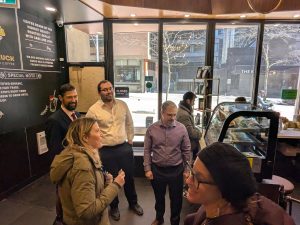If you’re on the campus of Hampshire College in Amherst, Mass., a five-minute walk will take you to a rare sight: a museum-bookstore-library known for playing a significant role in the preservation of Yiddish culture.
Funnily enough, the Yiddish Book Center has Canadian roots, thanks to its founder and CEO Aaron Lansky, who recently announced he will be stepping down from his role after 44 years of helming one of the leading Jewish cultural institutions in the U.S.
When Lansky, 68, was studying Yiddish literature at McGill University, he had a difficult time finding the books he needed. He visited the Jewish Public Library to source what he could, but he extended his outlook toward the Jewish community. “I would even knock on doors of people who may have had the Yiddish books we needed, and they’d invite me in and we’d talk about the books over tea, and they were often astonished such a young student was interested in Yiddish,” Lansky recalls in an interview from his home in Stockbridge, Mass.
A lightbulb moment crystallized what he wanted to do next: “To save the world’s Yiddish books before it was too late,” as he writes in his 2004 memoir, Outwitting History.
Growing up a minority in New Bedford, Mass., heightened his sense of identity and the keen sense of community he sought to rebuild. “The marginality imposed a sense of social consciousness in some way,” he said in an interview in 2014.
Fast-forward two decades and he embarked on a mission to gather 1.5 million Yiddish books to give this quest an actual bricks-and-mortar hub. In 1980, he established the Yiddish Book Center and organized a network of zamlers (volunteer book collectors) and later a slew of translators. He also partnered with institutions such as the Jewish Public Library in Montreal.

He recalls, “They would collect duplicate books, and we’d go north and pick them up and bring them back down again, and we would also send them books if they needed them.”
The Center began to gain momentum, especially when director Steven Spielberg donated funds to establish an online library of digitized Yiddish books where anyone can read free thousands of titles. “When I met him one time in L.A., I was only supposed to have 15 minutes with him but we talked and talked for two hours about Yiddish literature and Jewish culture, and he ended up giving us more money than we asked for,” Lansky says.
The project Spielberg funded has so far seen more than 5 million downloads of titles from the Yiddish Book Center, such as Sholem Aleichem’s Verk series and the poetry of Ida Maze.
“The downloads really exploded during the pandemic when people were just at home, wondering what to do,” says Lansky.
In the past decade, the Center has also launched two other critical branches: White Goat Press, which publishes newly translated Yiddish works, and a trove of hundreds of recordings of lectures with writers and poets that took place at the Jewish Public Library between 1953 and 2005.
The Center is also active in other areas, such as running summer classes in Yiddish, and publishing a new two-volume text for students taking basic Yiddish courses. It also hosts lecture series and panel talks, such as interviews with Yiddish translators and a discussion on the best mail-order Jewish food kitchens in the U.S.
In 2011, the Center launched the English-language podcast The Schmooze to share insight on Yiddish and Jewish culture, even profiling KlezKanada’s music festival in several episodes.
Lansky, who won a MacArthur fellowship in 1989, announced he will retire in June 2025 as he seeks to pass the baton to Susan Bronson, who has been executive director for 14 years. “I’m getting older, and want to focus on other projects like writing, and it’s important to give the Center some fresh energy,” he says.
Don’t tell Lansky that Yiddish is a dying language. He dismisses that assertion with a laugh, saying, “I’ve seen how younger people all over the world are becoming interested in Yiddish literature and it could be due to a historiographical revolution I’ve seen where suddenly social and cultural history were more important to these youth. Therefore, Yiddish books were becoming more important in order to get that to understand Jewish culture.”
Before he signs off, though, he’s proud to have laid the groundwork helping coordinate a massive project that will aim to debut this winter: through partnerships with the New York Public Library and the YIVO Institute for Jewish Research, the Center will go live with a joint website that will house the world’s largest collection of Yiddish books, Lansky says. “It’s going to be incredible.”







